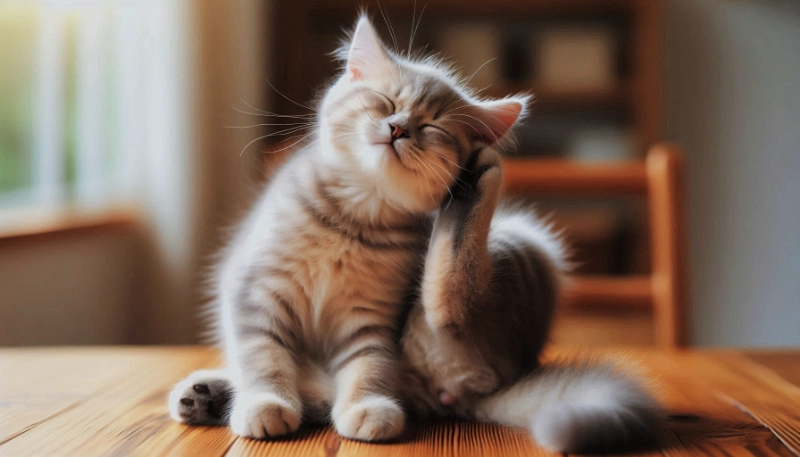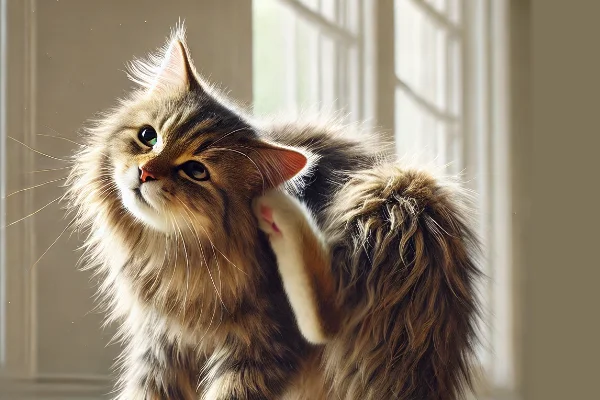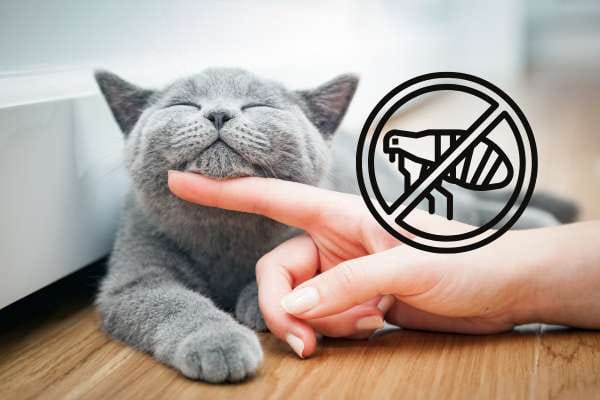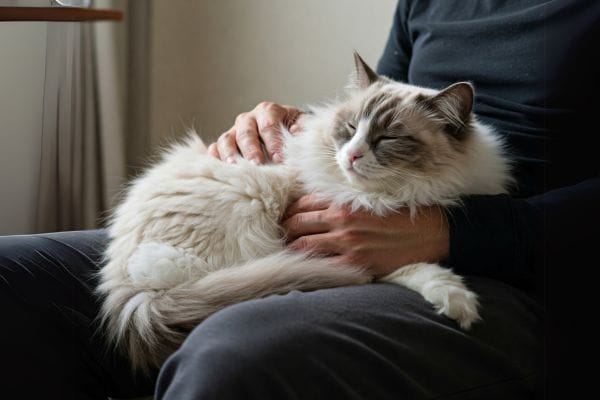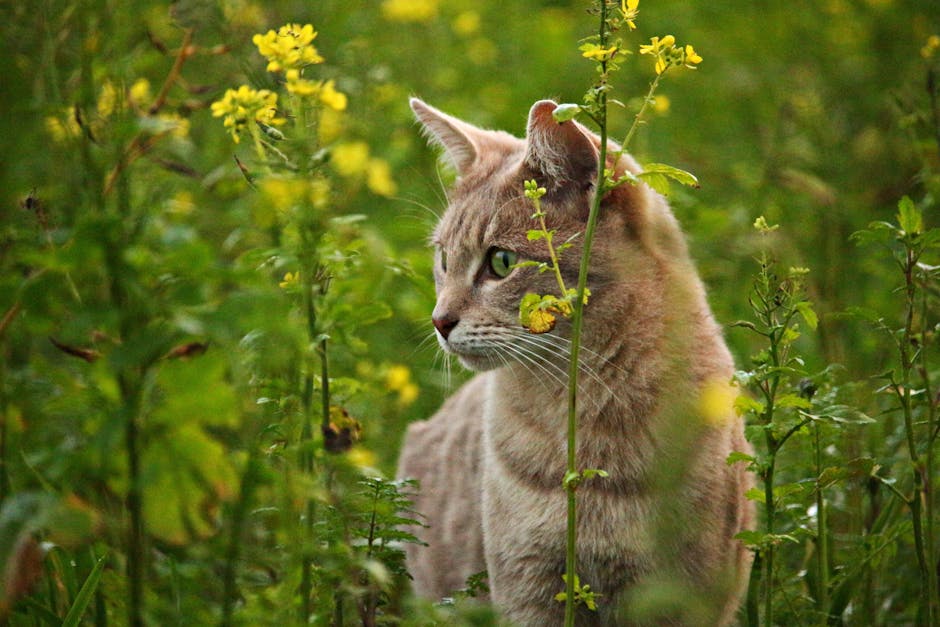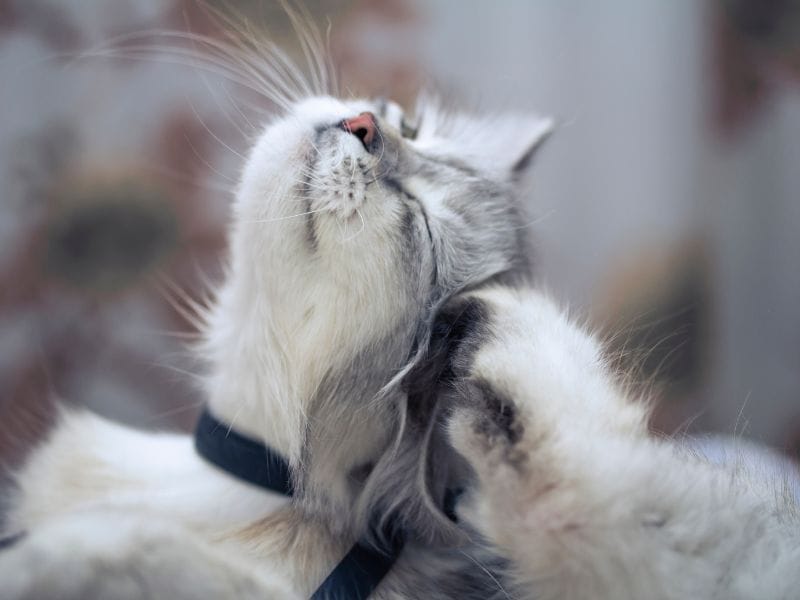If you’re concerned about your cat’s stress levels, you’re not alone. Cats can become anxious or stressed due to changes in their environment, medical issues, or even simple things like loud noises. Prolonged stress can lead to serious health problems, such as digestive issues, skin conditions, and a weakened immune system. Fortunately, there are many natural ways to calm your stressed cat without resorting to medication. In this post, you’ll learn effective techniques to help your feline friend feel more relaxed and content, from creating a peaceful environment to using calming aids and natural remedies.
Key Takeaways:
- Provide a Safe Space: Create a quiet, cozy area where your cat can retreat from stressors, such as a separate room or a covered crate with familiar blankets and toys.
- Reduce Noise Levels: Minimize loud noises that can exacerbate stress, like loud music or construction sounds, and provide white noise alternatives like a fan or calming music.
- Pheromone Therapy: Use synthetic pheromone products, such as Feliway, to mimic natural feline pheromones that promote relaxation and reduce anxiety.
- Massage and Touch Therapy: Gentle petting, stroking, and massage can help calm your cat, but be sure to respect their boundaries and personal space.
- Encourage Exercise and Play: Engage your cat in play activities, like chasing a laser pointer or feather toy, to help burn off excess energy and reduce stress.
Understanding Feline Stress
A stressed cat can be a challenging and worrisome situation for any pet owner. As you try to understand your cat’s behavior, it’s imperative to recognize that felines experience stress just like humans do. By acknowledging the signs and causes of stress, you can take steps to create a more calming environment for your cat.
Identifying Stress Factors in Cats
Feline stress can arise from various sources, including changes in their environment, medical issues, and even interactions with other pets or people. The key to addressing your cat’s stress is to identify the underlying causes and make adjustments accordingly.
- Changes in your work schedule
- Moving to a new home
- Introducing new pets or people
- Loud noises or disruptions
Common Signs of Stress in Cats
To recognize if your cat is stressed, look for subtle changes in their behavior and physical condition. You may notice excessive grooming, vocalization, or withdrawal from social interactions.
This behavior change can be a sign of underlying anxiety or stress. If you suspect your cat is stressed, observe their behavior closely and try to identify the potential causes. Increased heart rate and blood pressure can lead to more severe health issues if left unaddressed. By recognizing the signs of stress early on, you can take proactive steps to create a more calming environment for your cat.
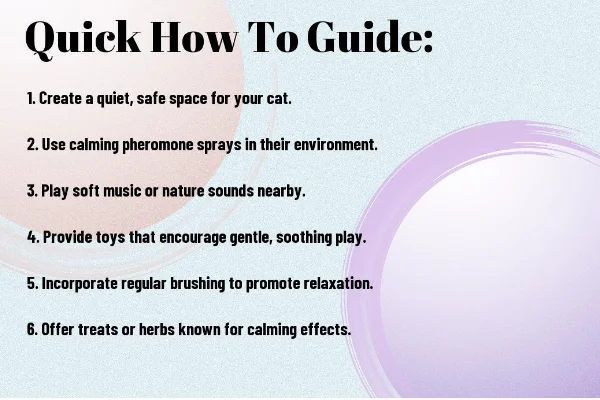
Creating a Calming Environment
Any changes you make to your home can have a significant impact on your cat’s stress levels. A calm environment can work wonders for your feline friend’s anxiety. According to experts, a Globally Used 100% Natural Cat Anxiety Remedy can also be a great addition to your calming strategy.
Tips for Reducing Noise and Chaos
Little things can make a big difference when it comes to reducing noise and chaos in your home. [It’s vital to prioritize your cat’s comfort and well-being.] This is especially true when it comes to creating a peaceful atmosphere. Some simple steps you can take include:
- Maintaining a consistent daily routine to reduce unpredictability.
- Minimizing loud noises by keeping the TV volume down or using white noise machines.
- Providing a quiet space for your cat to retreat to when feeling overwhelmed.
How to Create a Soothing Space for Your Cat
Clearly, a soothing space is vital for your cat’s relaxation and stress relief. By creating a calm and peaceful area, you can help your cat feel more secure and comfortable.
Understanding your cat’s preferences and personality is key to creating a soothing space. You may need to experiment with different textures, colors, and scents to find what works best for your feline friend. Consider adding calming elements such as a pheromone diffuser, a heated bed, or a cozy hiding spot. By doing so, you can create a safe haven where your cat can retreat when feeling anxious or stressed.

Natural Remedies for Calming Cats
Keep in mind that every cat is different, and what works for one may not work for another. However, there are several natural remedies that have been proven to be effective in calming cats. From pheromone therapy to herbs and aromatherapy, these remedies can help reduce your cat’s stress and anxiety without resorting to medication.
The Benefits of Pheromone Therapy
Reliable remedies like Feliway mimic natural feline pheromones, which can help calm your cat in stressful situations. By simulating the pheromones mother cats produce to calm their kittens, these products can provide a sense of security and comfort for your cat.
Using Herbs and Aromatherapy to Calm Cats
Utilizing calming herbs like chamomile and lavender can have a profound impact on your cat’s stress levels. [Be sure to consult with a veterinarian before using any herbal remedies.] These natural wonders can be used in teas, tinctures, or even vital oils to create a calming atmosphere for your cat.
Cats have a unique sense of smell, which makes aromatherapy an effective way to calm them. Certain scents like vanilla and bergamot have been shown to reduce anxiety and stress in cats. By using a diffuser or adding a few drops of oil to your cat’s bedding, you can create a calming environment that promotes relaxation. [Always dilute vital oils with a carrier oil to avoid skin irritation.]
Diet and Nutrition for a Calm Cat
Unlike other factors that contribute to your cat’s stress, diet and nutrition are within your control. By making informed choices, you can help alleviate your cat’s anxiety and promote a sense of calm.
How Food Choices Can Impact Your Cat’s Mood
Any changes to your cat’s diet can affect their mood, and some ingredients can even exacerbate stress. [It’s crucial to consult with your veterinarian before making any significant changes to your cat’s diet.] For example, foods high in carbohydrates can lead to energy crashes, causing irritability and anxiety in cats.
Nutritional Supplements for Reducing Stress
Some cat owners have found success in reducing their cat’s stress levels by incorporating nutritional supplements into their diet. These supplements can help fill nutritional gaps and promote relaxation.
For instance, L-theanine, an amino acid found in green tea, has been shown to have a calming effect on cats. Other supplements like Omega-3 fatty acids and GABA can also help reduce anxiety and promote relaxation. However, it’s crucial to consult with your veterinarian before adding any supplements to your cat’s diet, as they may interact with medications or exacerbate underlying health conditions.

Exercise and Play for Reducing Stress
All cats need physical activity to stay healthy and happy, and exercise can play a significant role in reducing stress in your feline friend.
The Importance of Physical Activity for Cats
The lack of physical activity can lead to boredom, obesity, and anxiety in cats, which can further exacerbate stress [it’s imperative to provide your cat with regular opportunities for exercise and play].
Fun Ways to Encourage Exercise and Play
Activity levels can be boosted through playtime with toys, feather wands, or laser pointers, as well as providing climbing structures and scratching posts [rotate toys regularly to keep your cat engaged and interested].
Reducing stress through exercise and play is all about creating a stimulating environment that encourages your cat to get moving. Try hiding treats or kibble around the house to encourage your cat to search and hunt, or set up a “cat agility course” using cardboard boxes and tunnels. Make sure to tailor activities to your cat’s age, breed, and abilities, and always supervise playtime to ensure your cat’s safety. By incorporating exercise and play into your cat’s daily routine, you can help reduce stress and anxiety and promote overall well-being.
Additional Tips for Calming Your Cat
Despite your best efforts, your cat may still experience stress and anxiety. To further support their well-being, consider the following tips:
- Avoid punishment or negative reinforcement, as this can exacerbate stress and create more anxiety.
- Provide a stable routine, including regular feeding times, play, and sleep schedules.
Any small changes you make can have a significant impact on your cat’s overall calmness and happiness.
Providing Mental Stimulation and Enrichment
Assuming your cat is receiving adequate physical care, providing mental stimulation and enrichment can help reduce stress and boredom. Try offering puzzle toys filled with treats or engaging in play with feather wands or laser pointers [providing mental stimulation is important for your cat’s overall well-being].
Managing Changes and Transitions in Your Cat’s Life
Calmly introducing new people, pets, or environments can help minimize your cat’s stress levels. Gradual exposure to new stimuli can help them feel more comfortable and secure.
Changes in your work schedule, moving to a new home, or introducing new family members can be extremely stressful for your cat. To mitigate this stress, try to maintain a sense of routine and normalcy, and provide plenty of attention and reassurance. It’s also important to monitor your cat’s behavior and adjust your approach as needed. By doing so, you can help your cat feel more secure and calm during times of change.
Conclusion
So, now that you’ve learned these simple and effective natural methods to calm your stressed cat, you can provide your feline friend with a more peaceful and comfortable life. By recognizing the signs of stress and using techniques such as pheromone therapy, calming music, and gentle touch, you can help reduce your cat’s anxiety and create a happier home environment. With patience and consistency, you can make a significant difference in your cat’s well-being, and strengthen the bond between you and your beloved pet.
FAQ
Q: What are the common signs of stress in cats?
A: Cats exhibit stress in various ways, including changes in appetite, vocalization, hiding, pacing, excessive grooming, or changes in litter box behavior. Some cats may also display physical symptoms like panting, trembling, or rapid breathing. If you notice any of these signs, it’s important to identify the source of stress and take steps to alleviate it.
Q: How can I create a calming environment for my stressed cat?
A: Creating a peaceful atmosphere can significantly help calm your cat. Start by reducing noise levels, providing a quiet space, and blocking access to windows or outdoor views that may be causing anxiety. You can also use calming aids like pheromone diffusers, calming music, or a heated bed to create a cozy and relaxing environment. Additionally, ensure your cat has access to vertical spaces, such as cat trees or shelves, where they can retreat and feel safe.
Q: What natural remedies can I use to calm my stressed cat?
A: There are several natural remedies you can try to calm your stressed cat. One popular option is L-theanine, an amino acid found in green tea that has a calming effect on cats. You can also try using calming treats or supplements containing herbs like chamomile, lavender, or valerian root. Another option is to use aromatherapy, such as important oils like lavender or bergamot, which can be added to your cat’s bedding or used in a diffuser. Always consult with your veterinarian before introducing new remedies to ensure they are safe for your cat.
Q: Can exercise and play help reduce my cat’s stress levels?
A: Yes, exercise and play can be an excellent way to reduce your cat’s stress levels. Engage your cat in play activities that stimulate their natural hunting instincts, such as chasing a laser pointer or playing with feather toys. You can also try providing puzzle toys filled with treats to challenge and engage your cat’s mind. Regular exercise and play can help burn off excess energy and reduce anxiety in cats.
Q: How can I help my cat cope with changes or transitions that may be causing stress?
A: Cats are creatures of habit and can be sensitive to changes in their environment. To help your cat cope with changes or transitions, introduce them gradually and in a controlled manner. For example, if you’re moving to a new home, bring your cat’s familiar belongings, such as their bed or toys, to the new location. You can also try providing a familiar scent, like a blanket or clothing that smells like you, to provide comfort and reassurance. With patience and consistency, your cat can learn to adapt to new situations and reduce their stress levels.


